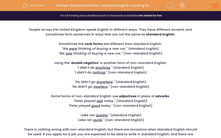People across the United Kingdom speak English in different ways. They have different accents and sometimes form sentences in ways that are not the same as standard English.
Sometimes the verb forms are different from standard English.
"We were thinking of buying a new car." (standard English)
"We was thinking of buying a new car." (non-standard English)

Using the 'double negative' is another form of non-standard English.
"I didn't do anything." (standard English)
"I didn't do nothing." (non-standard English)

"He didn't go anywhere." (standard English)
"He didn't go nowhere." (non-standard English)
Some forms of non-standard English use adjectives in place of adverbs.
"Peter played well today." (standard English)
"Peter played good today." (non-standard English)
"Jake ran quickly." (standard English)
"Jake ran quick." (non-standard English)

There is nothing wrong with non-standard English, but there are occasions when standard English should be used.
If you apply for a job, you will be expected to be able to write in standard English, and there are many situations in school where you need to use standard English.
Let's have a go at practising this in these questions.








